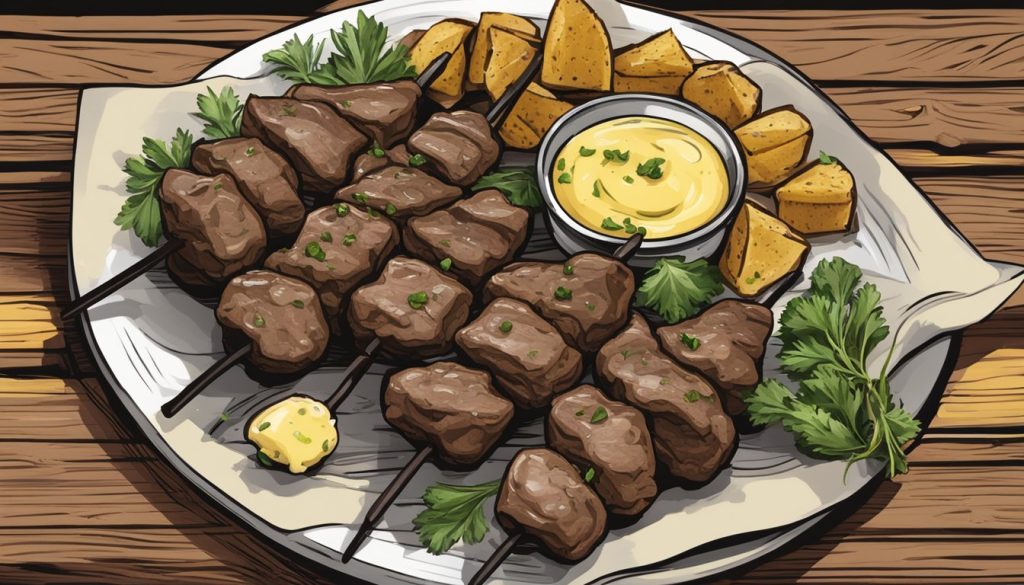The carnivore diet has gained popularity among health enthusiasts seeking optimal nutrition. This eating approach focuses exclusively on animal-based foods, eliminating plant sources entirely. While controversial, proponents argue it can offer unique benefits, including improved access to essential nutrients like bioavailable copper.
Copper plays a vital role in numerous bodily functions, and the carnivore diet may provide higher levels of readily absorbable forms compared to plant-based diets. Animal foods like organ meats, shellfish, and certain cuts of beef contain concentrated amounts of copper that the body can efficiently utilize. This bioavailability is crucial for supporting enzyme function, iron metabolism, and maintaining healthy connective tissues.
The carnivore diet’s emphasis on nutrient-dense animal products may offer advantages for those seeking to optimize their copper intake. However, it’s important to note that a varied diet can also provide adequate copper. Individuals considering any significant dietary changes should consult with a healthcare professional to ensure their nutritional needs are met appropriately.
Carnivore Diet Fundamentals

The carnivore diet focuses exclusively on animal-based foods, eliminating all plant products. This approach aims to optimize nutrition through highly bioavailable nutrients found in animal sources.
Defining the Carnivore Diet
The carnivore diet consists of meat, fish, eggs, and some dairy products. It excludes all plant-based foods, including fruits, vegetables, grains, and legumes.
Proponents argue that this diet provides essential nutrients in their most accessible forms. Animal proteins offer complete amino acid profiles, while animal fats supply energy and support hormone production.
Some practitioners include organ meats for their high nutrient density. These foods are rich in vitamins and minerals, including bioavailable copper.
Comparison with Ancestral and Ketogenic Diets
The carnivore diet shares similarities with both ancestral and ketogenic diets. Like ancestral diets, it emphasizes whole, unprocessed foods that humans have consumed for millennia.
Carnivore and ketogenic diets both restrict carbohydrates, leading to ketosis. However, the carnivore diet is more restrictive, eliminating all plant foods.
While ketogenic diets allow some low-carb vegetables, the carnivore diet relies solely on animal products. This difference impacts nutrient intake and gut microbiome composition.
Advocates claim the carnivore diet may reduce inflammation and improve certain health markers. However, long-term studies on its effects are limited.
The Importance of Liver in the Carnivore Diet

Liver stands out as a nutritional powerhouse in the carnivore diet. It provides a concentrated source of essential nutrients that are crucial for optimal health and well-being.
Nutrient Profile of Liver
Liver contains an impressive array of vitamins and minerals. It is exceptionally rich in vitamin A, which supports immune function and vision. A single serving of liver can provide several times the recommended daily intake of this vital nutrient.
Vitamin B12, essential for nerve function and red blood cell formation, is abundant in liver. This makes it particularly valuable for carnivore dieters who may have limited B12 sources.
Liver is also an excellent source of heme iron, the most bioavailable form of iron. This mineral is crucial for oxygen transport and energy production in the body.
Other notable nutrients found in liver include copper, zinc, and selenium. These minerals play important roles in various bodily functions, from immune support to antioxidant protection.
Incorporating liver into a carnivore diet can help ensure adequate intake of these essential nutrients, potentially addressing nutritional gaps that may arise from a limited food selection.
Bioavailable Copper Benefits
Bioavailable copper plays crucial roles in numerous bodily functions. It supports energy production, immune health, and enzyme activity, making it an essential nutrient for overall wellbeing.
Roles in the Body
Copper acts as a cofactor for various enzymes, enabling critical biochemical reactions. It supports the formation of collagen and elastin, key components of connective tissues. Copper also aids in iron metabolism, helping to prevent anemia.
The mineral contributes to melanin production, giving color to skin and hair. It plays a part in maintaining healthy bones and blood vessels. Copper’s antioxidant properties help protect cells from damage caused by free radicals.
Copper in Energy Production and Immune Function
Copper is vital for cellular energy production. It’s a key component of cytochrome c oxidase, an enzyme crucial for ATP synthesis in mitochondria. This process fuels all bodily functions, from muscle contraction to brain activity.
In the immune system, copper enhances the function of immune cells. It supports the production of white blood cells and strengthens their ability to fight pathogens. Copper also exhibits antimicrobial properties, helping to defend against harmful microorganisms.
The mineral aids in the synthesis of prostaglandins, which regulate inflammation. This function contributes to a balanced immune response and overall health.
Nutrient Biochemistry in Carnivore Diets

The carnivore diet provides a unique nutritional profile that impacts nutrient absorption and utilization. Key interactions between vitamins and minerals play a crucial role in optimizing health outcomes for those following this dietary approach.
Synergy of Vitamins and Minerals
Carnivore diets offer highly bioavailable forms of essential nutrients. Heme iron, abundant in animal foods, is more readily absorbed than non-heme iron from plant sources. This enhanced absorption can lead to improved iron status in individuals.
Vitamin C, often associated with fruits and vegetables, is present in organ meats like liver. While the amounts are lower than in plant-based diets, the vitamin C in animal tissues may be sufficient to prevent deficiency in some carnivore dieters.
Magnesium, zinc, and other minerals found in meat and organ meats work synergistically. For example, magnesium aids in the absorption and metabolism of vitamin D, which is crucial for calcium absorption and bone health.
Copper Interaction with Zinc and Iron
Copper plays a vital role in carnivore diets, interacting closely with zinc and iron. Animal-based foods provide copper in highly bioavailable forms, potentially leading to improved absorption compared to plant-based sources.
The balance between copper and zinc is critical. Excessive zinc intake can interfere with copper absorption, while adequate copper is necessary for proper iron metabolism. Carnivore diets typically provide these minerals in ratios that support optimal absorption and utilization.
Iron and copper work together in the formation of hemoglobin. The heme iron found in animal products is efficiently absorbed and utilized by the body, with copper acting as a cofactor in this process.
Organ meats, particularly liver, are rich sources of both copper and iron. This natural pairing in animal tissues may contribute to more efficient nutrient absorption and utilization in carnivore diets.
Copper Toxicity and Balance

Copper plays a vital role in health, but excessive intake can lead to toxicity. Understanding the balance between adequate copper and potential overload is crucial for those following a carnivore diet.
Identifying and Preventing Toxicity
Copper toxicity can manifest through various symptoms. These may include fatigue, nausea, abdominal pain, and in severe cases, liver damage. Monitoring copper intake is essential, especially for individuals with certain medical conditions or those using copper-based contraceptives.
Preventing toxicity involves careful dietary choices. Limiting high-copper foods and ensuring adequate zinc intake can help maintain balance. Zinc competes with copper for absorption, acting as a natural regulator.
Regular blood tests can detect elevated copper levels. If toxicity is suspected, reducing copper-rich foods and increasing zinc-rich options may be necessary. In some cases, medical intervention might be required.
The Role of Organ Meats and Shellfish
Organ meats and shellfish are significant sources of bioavailable copper in a carnivore diet. Liver, for example, is exceptionally rich in copper. A 3-ounce serving of beef liver contains about 12 mg of copper, which is 1300% of the daily value.
Shellfish like oysters and lobster also provide substantial amounts of copper. While these foods offer numerous nutritional benefits, moderation is key to prevent copper overload.
Balancing copper intake involves rotating organ meats and shellfish with other protein sources. Consuming these foods 1-2 times per week can provide adequate copper without risking toxicity. It’s important to consider individual needs and health status when incorporating these copper-rich foods into a carnivore diet.
Robust Organ Meats in a Carnivore Lifestyle

Organ meats provide exceptional nutritional value in a carnivore diet. They offer a concentrated source of essential vitamins and minerals that support overall health and well-being.
Nutritional Advantages of Beef Liver
Beef liver stands out as a nutritional powerhouse among organ meats. It contains high levels of bioavailable copper, crucial for various bodily functions.
Beef liver is rich in retinol, the preformed version of vitamin A. This nutrient supports eye health, immune function, and skin integrity. A single serving of beef liver can provide several times the recommended daily intake of vitamin A.
Vitamin D, essential for bone health and immune function, is also present in beef liver. While not as abundant as in fatty fish, it contributes to overall vitamin D intake.
Beef liver is an excellent source of vitamin B6, which plays a key role in metabolism and brain function. It aids in the production of neurotransmitters and supports cognitive health.
Other organ meats like heart and kidneys offer unique nutritional profiles. They provide coenzyme Q10, an antioxidant that supports heart health and energy production.
Incorporating organ meats into a carnivore diet ensures a diverse nutrient intake. They complement muscle meats, providing a well-rounded nutritional approach for those following this dietary lifestyle.
Incorporating Seafood for Optimal Health

Seafood offers a wealth of essential nutrients that can enhance a carnivore diet. It provides high-quality protein, omega-3 fatty acids, and vital minerals like copper, supporting overall health and well-being.
Seafood as a Source of Essential Nutrients
Seafood, especially oysters, is an excellent source of bioavailable copper. This mineral plays a crucial role in energy production and maintaining healthy connective tissues. Oysters also contain high levels of zinc, supporting proper sex hormone function and gene transcription.
Fatty fish like salmon and mackerel are rich in omega-3 fatty acids, particularly EPA and DHA. These essential fats contribute to heart health and reduce inflammation in the body. They also support brain function and may help lower the risk of chronic diseases.
Many types of seafood provide vitamin D, a nutrient often lacking in strict carnivore diets. Vitamin D is essential for bone health, immune function, and mood regulation. Cod liver oil and fatty fish are particularly good sources.
Seafood’s nutrient density makes it a valuable addition to a carnivore diet. It offers a diverse range of vitamins and minerals without the anti-nutrients found in plant foods, which can interfere with nutrient absorption.
Addressing Common Health Conditions
Bioavailable copper from a carnivore diet may impact various health conditions. Its potential effects on metabolism and hormone regulation could influence obesity, diabetes, PCOS, and insulin resistance.
Impact on Obesity and Diabetes
A carnivore diet rich in bioavailable copper may support weight management and blood sugar control. Copper plays a role in glucose metabolism and insulin sensitivity. Research suggests that adequate copper intake could help regulate appetite and fat storage.
Some studies indicate that copper deficiency may contribute to obesity and metabolic disorders. By providing readily absorbed copper, a carnivore diet might help address these issues. Improved insulin function and reduced inflammation are potential benefits.
Copper’s involvement in energy production could also boost metabolism. This may aid in weight loss efforts for individuals with obesity. Additionally, the high protein content of a carnivore diet often leads to increased satiety, potentially reducing overall calorie intake.
Potential Benefits for PCOS and Insulin Resistance
Women with Polycystic Ovary Syndrome (PCOS) may find relief through a carnivore diet’s bioavailable copper content. Copper is essential for hormone production and regulation. It may help balance androgens, which are often elevated in PCOS.
Insulin resistance, a common feature of PCOS, might also improve with adequate copper intake. Copper enhances insulin sensitivity, potentially reducing the risk of developing type 2 diabetes. This effect could be particularly beneficial for women with PCOS who are at higher risk for metabolic disorders.
The anti-inflammatory properties of bioavailable copper may further support PCOS management. Chronic inflammation is often associated with PCOS and insulin resistance. By reducing inflammation, a copper-rich carnivore diet might alleviate some symptoms and improve overall metabolic health.
Practical Guide to Selecting Animal-Based Foods

Selecting high-quality animal-based foods is crucial for maximizing nutritional benefits on a carnivore diet. Proper sourcing ensures optimal nutrient density and bioavailability of essential elements like copper.
Choosing Quality Meats and Seafood
When selecting meats, prioritize cuts from ruminant animals like beef, lamb, and bison. These tend to have higher nutrient profiles. Look for bright red color in beef and pink in pork. Avoid meats with a grayish tint or excessive liquid in packaging.
For seafood, freshness is key. Choose fish with clear eyes and firm flesh. Wild-caught options often contain higher levels of omega-3 fatty acids. Shellfish like oysters are excellent sources of bioavailable copper and zinc.
Organ meats deserve special attention. Liver, particularly from grass-fed animals, is rich in vitamins and minerals. Cod liver oil provides concentrated amounts of vitamins A and D.
Understanding the Importance of Grass-Fed Options
Grass-fed animal products offer superior nutritional value compared to grain-fed counterparts. These meats typically contain higher levels of omega-3 fatty acids and conjugated linoleic acid (CLA).
Grass-fed beef has a more favorable omega-6 to omega-3 ratio. This can help reduce inflammation in the body. It also tends to be leaner while providing more vitamins A and E.
The grazing lifestyle of grass-fed animals results in meat with higher levels of antioxidants. These include beta-carotene and vitamin E. Grass-fed dairy products, if included, offer higher concentrations of beneficial fatty acids.
Beyond Nutrition: Mental and Digestive Health

The carnivore diet’s impacts extend beyond physical nourishment, influencing cognitive function and digestive wellness. Bioavailable copper from animal sources plays a key role in these areas.
Cognitive Benefits and Mental Clarity
A carnivore diet rich in bioavailable copper supports brain health and mental clarity. Copper is essential for neurotransmitter production and myelin formation, which are crucial for cognitive function.
Studies suggest that adequate copper intake may improve focus and reduce brain fog. The diet’s high B-vitamin content, particularly B12, further enhances mental acuity and mood regulation.
Animal-based foods provide zinc and omega-3 fatty acids, which are linked to reduced symptoms of anxiety and depression. These nutrients work synergistically with copper to support overall mental health.
Carnivore Diet and Gut Health
The carnivore diet’s impact on digestive health is notable. By eliminating plant-based irritants, many individuals report improvements in gut-related issues.
Bioavailable copper aids in maintaining a healthy gut lining. It supports the production of digestive enzymes, enhancing nutrient absorption and reducing inflammation.
Some people experience a reduction in symptoms of irritable bowel syndrome (IBS) on a carnivore diet. The diet’s simplicity may allow the gut to heal and rebalance.
Copper’s antimicrobial properties can help manage gut bacteria, potentially reducing harmful overgrowth. This may lead to improved digestion and reduced bloating for some individuals.
